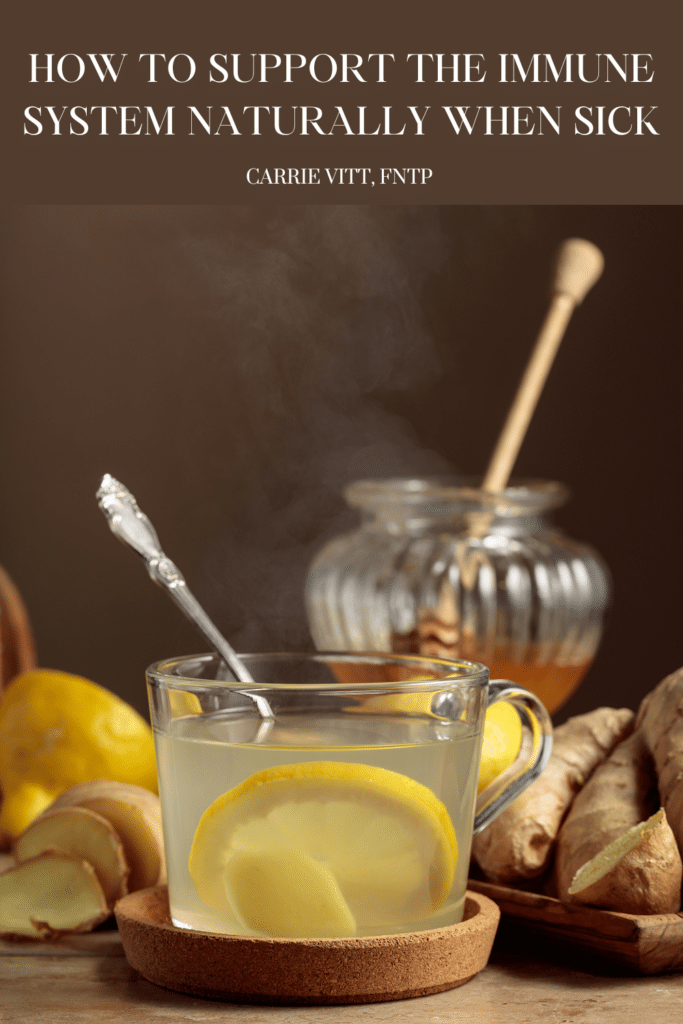There are so many ways that we can support the immune system naturally, especially during cold and flu season. So today, I want to give you some holistic, nutritional therapy tips that you can use to help support your body with food and supplements when you’re sick.
First, here two key things to understand about illness and your body:
1. When the body is sick, it uses up nutrients in your body very quickly, so it’s important to replenish those nutrients while you’re not feeling well so that your immune system has what it needs it needs to fight and recover.
For example: when we have a fever, the body uses up Vitamin A (aka retinol) very quickly, so replenishing with supplementation like cod liver oil can be very helpful.
2. Symptoms such as a cough, drainage, feeling achy, a fever, etc. are all ways the body is going through he process of fighting and getting rid of whatever it needs to get rid of, be it a virus, bacteria, toxin, etc.
When we take symptom suppressing medications, this reduces the body’s ability to fight and heal, and in the long-run can actually cause further issues.
Please note: I’m not saying to never use conventional medications for pain or other symptoms. Sometimes we need these things. But, it’s good to know that there are so many ways we can support the body through the healing process so that when the body is healed, it’s stronger and has had the chance to fully fight whatever it was fighting.
Here are the steps I personally take to support the immune system with food and supplements when I get sick:
1. Eat lacto-fermented vegetables – Foods such as kefir, sauerkraut and other facto-fermented foods and beverages encourage the growth of protective bacteria which can safeguard your body from pathogenic viruses and bacteria.
This study showed how kefir can be beneficial for the prevalent virus that starts with a C.
When I’m sick, I like to have a few bites of fermented vegetables a day.
2. Homemade bone broth or meat stock – homemade broths or stock support overall gut and immune health. You can drink 1-2 cups a day, heated with Celtic Sea Salt.
When I’m sick and need a meal, but I’m just not very hungry, I drink this “bulletproof” bone broth recipe. It’s very warming, comforting and offers lots of nutrients.
3. Sleep – Sleep is when the body not only rests, but it restores, detoxes, heals and repairs. When we are sick, 8-9+ hours of sleep a night is incredibly helpful so the body can have the time it needs to heal.
Most of us just try and push through, but this can often prolong whatever the body is needing the energy to fight. So, making sleep a priority is super important!
4. Castor oil packs – When castor oil is absorbed through your skin (according to Cayce and McGarey) your lymphocyte count increases. Increased lymphocytes speed up the removal of toxins from your tissues, which promotes healing.
I use castor oil packs regularly, to support my liver and highly recommend having the supplies on hand so you can use them when you get sick.
You can use the pack on various parts of the body. For example: if you have some kind of upper respiratory illness, using a pack over the lungs can be beneficial.
5. Avoid sugar and processed foods – sugar lowers your immune system almost immediately after digestion. When you are sick, it’s important to keep the immune system supported so it can do its job. So I make sure to avoid anything processed or with sugar.
6. Eat whole, nutrient-dense foods – As I mentioned above, the body uses up the nutrients the body has on hand when it is trying to heal, so replenishing the body with nutrient dense foods can be very helpful. Soups and stews are a wonderful option and provide the body with a wealth of nutrients.
If you don’t feel like eating, then sipping on warm meat stock or bone broth with some added Celtic Sea Salt can be helpful. I always keep some broth (homemade or Bonifide broth) in my freezer so that I have in on hand if I start to not feel well.
7. Gentle movement – the movement of the lymphatic system is very important to help the body eliminate toxins, including viruses and bacteria. So, even if you aren’t feeling well, make sure to move your body. This could be a very slow walk, stretching (even in bed when you’re lying down), or gentle bouncing on a rebounder.
8. Sunshine and fresh air – Vitamin D is very important to the immune system, so sitting outside in the sunlight helps restore D in the body. If you are sick, opening up the windows to let in fresh air and also getting outside for fresh air is very rejuvenating.
9. Epsom salt baths – Soaking in a warm bath with epsom salts is a great way to relax the body and also replenish magnesium and sulphur.
I recommend adding 1-2 cups of epsom salts to your bath and soak for about 20 minutes. Adding a few drops of your favorite essential oil can also be very nice!
10. Red light therapy – LLLT is a low intensity light therapy that triggers biochemical changes within cells and can be compared to the process of photosynthesis in plants, where the photons are absorbed by cellular photoreceptors and trigger chemical changes.
The light used for LLLT is a wavelength in the red to near infrared spectrum (600 – 1000nm) and has the ability to penetrate the skin and soft/hard tissues, and can help with pain, inflammation and tissue repair. It has also been shown to help accelerate the body’s ability to heal itself.
I purchased a photon red light from SaunaSpace a few years ago and have found it incredibly helpful when I’m not feeling well. Not only does it help accelerate the body’s ability to heal, it also helps calm the nervous system.
Here are the whole food supplements I recommend keeping on hand to support your immune system naturally. Please note that these supplements to not treat any kind of illness or disease. They simply provide helpful nutrients to support the body naturally.
Immuplex – This is a fantastic general immune support supplement. It’s an excellent source of iron, zinc, copper, chromium, folate and vitamins A, B6, and B12 and antioxidant vitamins C and E.
Suggested Use: 2 a day (or as directed).
The chewable variety can be a good option for kids 4 and older. The recommended dosage is 2 wafers per day.
Congaplex – This is what I reach for when I’m getting sick or am sick. It’s helpful for things such as congestion, sore throat, a viral infection, cold, flu, fever, etc.
Suggested Use: 2 capsules, 3-4x daily (or as directed).
There is also a chewable option for kids. For dosage, I recommend following the instructions on the label.
Calcium Lactate – this is a great option for viruses or when fever is present.
Suggested Use: 2 tablets, 3x a day (or as directed).
Cod liver oil – The Vitamin A and D in cod liver oil are very beneficial to support the body when sick.
As I mentioned above, the body uses up retinol (aka vitamin A) very quickly when it has a fever, so I like to supplement with cod liver oil until the body temperature comes back down.
Suggested Use: 3 a day (or as directed). These capsules are on the larger side, so you can bite them open and then suck out the cod liver oil. It’s flavored with lemon, so the taste is not too bad!
Drenamin – when the body is sick, the adrenals have to work overtime, so I like to support my body with Drenamin. It’s a combination of adrenal support, vitamin C (which contains tyrosinase, which is organic copper), and and combination of choline, B6 and riboflavin.
If you have very low blood pressure, be aware that it could create a drop in blood pressure. Again, this is why I always recommend talking to your practitioner about the best supplements for your situation.
Suggested Use: 1 at each meal
Echinacea Premium – this herbal supplement is helpful to support the immune system, respiratory tract and can help relive a dry, hoarse throat.
Suggested Use: 1 tablet, 2-3x daily (or as directed).
Thymex – this is helpful to decongest the lymph and can support the immune system. Three a day can be helpful for adults.
Suggested Use: 3 tablets, 2-3x daily (or as directed).
Zinc Chelate – This is a good source of zinc and copper to support the immune system. Zinc isn’t meant to be a long-term supplement, so I only recommend taking it when the body is deficient, or you need extra support when you’re not feeling well. I like this one because it contains the co-factors such as copper and iron.
Suggested Use: 2-3 daily until feeling better (or as directed).
Andographis complex: This contains Androgprahic, echinacea and holy basil to support the immune system. They are fantastic for respiratory functions, and to maintain a normal body temperature. I started using this about a year ago for when I’m not feeling well and have found it incredibly helpful!
Suggested use: 1 tablet 2-4x daily when not feeling well (or as directed).
Cataplex C: This is a fantastic vitamin C to use daily, or when you’re not feeling well.
Suggested use: 3 at each meal (or as directed)
Herbal Throat Spray: This spray is so helpful when you have a sore throat!
Suggested Use: 4 sprays into the mouth and swallow every 1 – 2 hours, or as directed.
Lastly, here are some of my favorite soups, stews and warm drinks to eat when I’m not feeling well. Of course, you may not feel like cooking when you’re sick, so you can always make one of these recipes ahead of time and put it in the freezer for when you really need it, or as a family member or friend to make one of these for you.
Bulletproof bone broth
Lemon Chicken and Vegetable Soup
Chicken Pot Pie Soup
Beef Stew (so nourishing and satisfying when you’re under the weather!)
Creamy Vegetable Soup
Overall, it’s really important to rest and nourish your body when you’re not feeling well, so your body can fight what it needs to fight and recover more quickly.
As always, please keep in mind this is not a comprehensive list, and of course, I recommend talking to your practitioner about what’s right for you.



